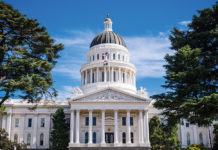Most people have heard the slogan “Only rain down the drain” or have seen decals near storm drain inlets with the words “DRAINS TO CREEK, NO DUMPING” on them. And we know what a wonderful environment we have in Sonoma and Mendocino Counties — our rivers and creeks are a major part of what is so great about living here. As you go about your daily tasks at work and home, you want to do what’s right to protect our environment, but sometimes it seems more convenient to overlook the responsible action, or just take a shortcut. It may seem easy to just clean a paint brush or roller with a hose into the street gutter or inlet rather than into the sink. After all, it’s just a little paint. Or when completing the replacement of a portion of a driveway you might be tempted to hose off the excess concrete into the nearby storm drain inlet — what else can you do with it? Let’s say the area around the dumpster or garbage can is getting a little dirty so why not a quick rinse with a hose to clean it up? It goes to a treatment plant, doesn’t it? These are all examples of how waste can end in our creeks.
In most cases people can avoid polluting creeks with their waste by following good basic housekeeping practices — essentially doing what we learned as kids: “Pick up after yourself and put things where they belong.”
So to help protect our creeks the City of Santa Rosa, in conjunction with the Russian River Watershed Association (RRWA), has developed lists of these simple housekeeping practices, now called Best Management Practices (or BMPs), for a variety of home and workplace categories.
To access this helpful resource, go to:
www.srcity.org/pollutionprevention and click on the Preventing Pollution at Work button and find a page with 24 categories of businesses that are the sources for many of the pollutants that reach our creeks. Click on the Preventing Pollution at Home button and find a page with 11 categories of house work that can lead to creek pollution. Each category has a bullet list of job functions that show simple methods to control waste and spills and how to dispose of them. Also on the page are phone contacts for the City of Santa Rosa, a few resource links, and a PDF version to save or be printed. There is also a list of County and City contacts for Mendocino and Sonoma Counties.
Every day we can act to protect local creeks by preventing storm water pollution in our homes, yards and businesses. Bookmark this website and use it a resource for how to safely use and dispose of materials that can pollute creeks and waterways. For a few business categories, the information is still being developed so check back – additional information will be added over time.
Why are these BMPs important?
Rainwater from storms, water from an irrigation break, or an unattended hose can pick up harmful pollutants from streets, parking lots, driveways, and yards and carry it directly into our creeks, lakes, the Russian River, and ultimately the Pacific Ocean.
Storm water does not go to any treatment plant, instead it flows through the storm drain system untreated into our creeks and waterways. Water that DOES undergo treatment is water that goes down a sink, toilet, an oil/water separator, or another inside drain. This water flows to the sewage treatment plant in a collection system that is separate from storm water.
In some areas creeks are the last “wild” places where habitat has not been altered or destroyed. Creeks also provide corridors connecting other usable habitat for wildlife. In California, 75 percent of our amphibian species and 50 percent of reptile species rely on creekside habitat for survival.
Some of our creeks are healthy, but many others are not, and all local creeks benefit from protection. Sightings of wildlife such as river otters and egrets remind us that we live and recreate along creeks that are part of a larger ecosystem, and that we are each responsible for the care of the creek network. The health of human communities depends on the health of the surrounding natural environment.
Forest Frasieur of the City of Santa Rosa, on behalf of RRWA. RRWA (www.rrwatershed.org) is an association of local public agencies in the Russian River Watershed that have come together to coordinate regional programs for clean water, fisheries restoration, and watershed enhancement.
83.4
F
Healdsburg
May 5, 2025








